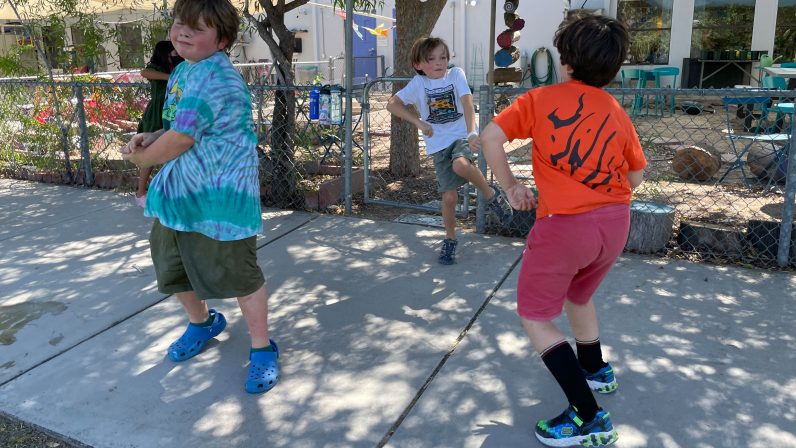These days fractals seem to occupy my mind. In her book, Emergent Strategy, adrienne maree brown describe fractals as “never-ending…infinitely complex patterns that are self-similar across different scales. They are created by repeating a simple process over and over in an ongoing feedback loop.” Further on in the chapter about fractals, she applies this pattern concept to how we behave in the world: “What we practice at the small scale sets the patterns for the whole system.” When I stay open, experiences that shift my consciousness find their way to me. One found me on Monday during recess when I was asked to assist with a spontaneous dance contest between the 3rd and 4th graders.
The whole situation, completely initiated by the kids, was an organically evolving event. There was excessive talking all at once, with a request for specific music. One child was designated at the judge, and then a second joined her, since it was an important job. There appeared to be few rules. The plan was for two children at a time to dance, and after a few minutes the music was stopped so the judges could make their decision about who was the best dancer. When the winner was declared, the next pair took to the sidewalk dance floor. It felt chaotic at best. Things got a bit more complex when one child was eliminated because “star points” had been deducted for certain infractions, none of which were previously mentioned. Needless to say, this caused a bit of frustration from the dancer. Everything took on a new level of complication when a decision had to be made between choosing the skills of one dancer over those of a best friend.
Fortunately, the bell rang before the “finals.” I thought about it all afternoon and multiple times throughout the night. The next day I decided I needed to speak up and change the course of this activity. It felt like a fractal moment. After talking with the teacher, we opened up a discussion. I told the kids that I had concerns over how the dance competition went, and thought we needed to make some changes. Here was their list of thoughts and concerns:
- disappointment about losing
- only one winner
- everyone should feel good about their performance
- in the world there is winning and losing
- you learn from losing
- judges had all the power
- huge responsibility on judges
I thought we needed to think of a way to alter the activity so there wasn’t so much emphasis on winning and losing, and to diversify the decision making power from two judges to the larger group. I was actually surprised at how many of them said winning and losing is just a part of life, and wondered how their perspectives might change if they were a winner or a loser. Midway through this process, I had my doubts that we’d find a solution. I wasn’t sure how we’d ever get to the point of resolution. Then one child raised their hand and cheerfully suggested, “Maybe we could have a talent show!” A collective sigh of relief from nearly everyone filled the room. Quickly the discussion shifted to ideas and questions about how to make the talent show happen. I knew it was out of my hands and would be handled skillfully by their teacher.
In retrospect, I’m glad I followed my instincts on this one. The shift to an event more congruent with the Seed mission statement seemed to provide a sense of relief in a variety of ways for all involved. It shifted the playing field, giving students the message that there is room in this world for everyone to feel safe, seen, and respected. Hopefully, this shift toward justice will influence the ways they navigate their future world. Small scale patterns do affect the whole.

